Our Preschool/Pre-Kindergarten Program
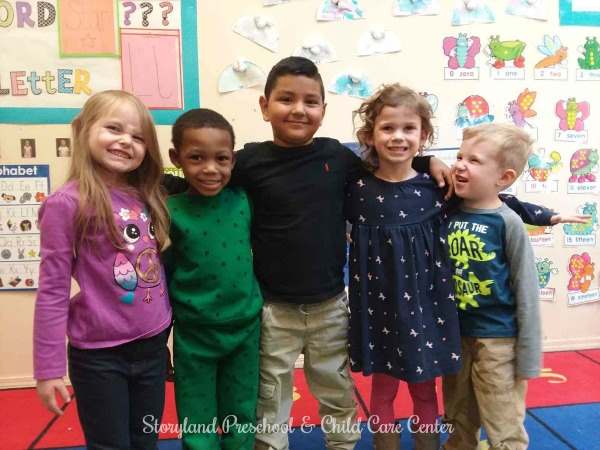 We have a very comprehensive preschool program here at Storyland Preschool with the goals of preparing children for kindergarten
We have a very comprehensive preschool program here at Storyland Preschool with the goals of preparing children for kindergartenChildren beginning at the age of 3 enjoy our preschool program which is an extension and expansion from our toddler program. At Storyland, we have five classrooms, two younger preschool classrooms and three older Pre-kindergarten rooms. All share the same high quality DLM Curriculum, and focus on quality activities that prepare the young learner for kindergarten.
Each child is unique and our program understands this and tailors learning experiences to meet the needs of every student. Children enjoy a wide range of learning experiences all provided in a structured, nurturing environment.
Learning Experiences in our Preschool Classrooms
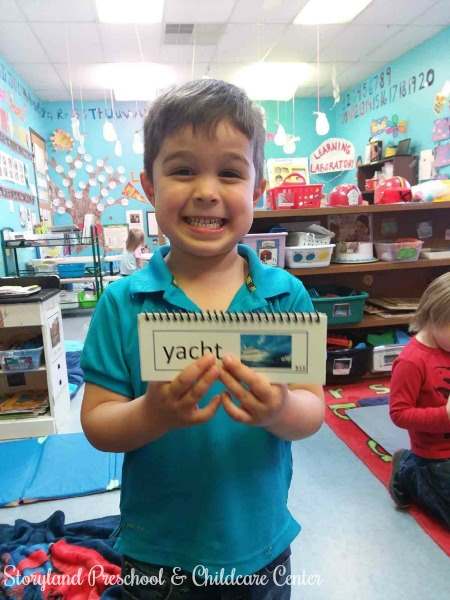 Children enjoy learning all the skills that lead up to reading on their own.
Children enjoy learning all the skills that lead up to reading on their own.Whether children are indoors or out, they are learning all the time. At Storyland we capitalize on children's natural curiosity and motivation to learn by providing a stimulating environment with many choices and opportunities to engage in meaningful learning tasks.
Children participate in large group, small group and individual pursuits in all areas of interest. Classrooms are set up into small sections or centers devoted to a separate type of learning. Here children can choose activities such as math and science games, Alphablet, writing, art, computer learning, pretend and learn or music.
We believe that it is important to address the needs of the whole child, so we provide activities that not only stimulate the brain, but exercise the body and feed the soul. We encourage cognitive, social, emotional and physical development.
We participate in the Texas School Ready Project that provides curriculum materials, classroom equipment, mentoring and training for our teachers. We follow the State of Texas, Pre-kindergarten curriculum guidelines that delineates what children should know before entering kindergarten.
You can be assured that at Storyland, your child's education is in good hands. Play is purposeful and teachers are ever mindful of individual's needs. We believe that education should be based on what the industry considers "best practices" and our program is state of the art.
Classrooms
Storyland has four preschool/pre-kindergarten classrooms broken down to two preschool classrooms and two pre-k classrooms. Preschool classrooms are for the younger preschool children and the two Pre-K classrooms are intended for children who will be entering kindergarten in the following school year.
Meals and Snacks
We serve a nutritious Breakfast, Lunch, and a healthy snack each day. To be able to operate such a high quality meal service, we depend on help through the CACFP (Child and Adult Food Program). This is a federal program, administered through the State and provides some reimbursement for meals served in Child Care Facilities like Storyland Preschool.
To participate in this Food Program, children will need to be in attendance during the hours that meals and snacks are served. There are many rules and regulations that govern this government program and Storyland depends on the program to provide a superior food service for your child. One very important regulation that we must follow is the timing of meals. Children must be present at the facility at the time meals are served. Unfortunately, we are unable to serve a meal to your child if he is late to school. Due take this into consideration when planning your daily schedule.
Goals for our Preschoolers
Social and Emotional Development
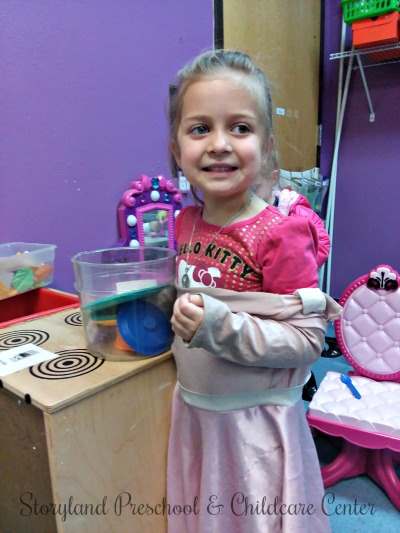 One goal of our preschool program is to guide social and emotional development
One goal of our preschool program is to guide social and emotional developmentGOAL: SENSE OF SELF
- Shows ability to adjust to new situations
- Demonstrates appropriate trust in adults
- Recognizes own feelings and manages them appropriately
- Stands up for rights
GOAL: RESPONSIBILITY FOR SELF AND OTHERS
- Demonstrates self-direction and independence
- Takes responsibility for own well-being
- Respects and cares for classroom environment and materials
- Follows classroom routines
- Follows classroom rules
GOAL: PROSOCIAL BEHAVIOR
- Plays well with other children
- Recognizes the feelings of others and responds appropriately
- Shares and respects the rights of others
- Uses thinking skills to resolve conflicts
Physical Development
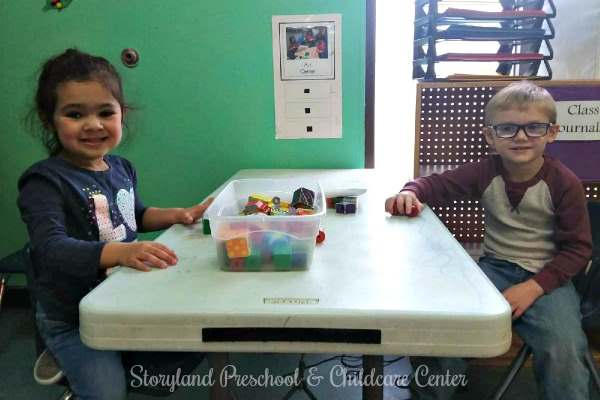 Physical Development not only includes large motor development but also strengthening and fine-tuning finger and hand dexterity
Physical Development not only includes large motor development but also strengthening and fine-tuning finger and hand dexterityGOAL: GROSS MOTOR
- Demonstrates basic locomotion skills (running, jumping, hopping, galloping)
- Shows balance while moving
- Climbs up and down
- Pedals and steers a tricycle (or other wheeled vehicle)
- Demonstrates throwing, kicking, and catching skills
GOAL: FINE MOTOR
- Controls small muscles in hands
- Coordinates eye-hand movement
- Uses tools for writing and drawing
Cognitive Development
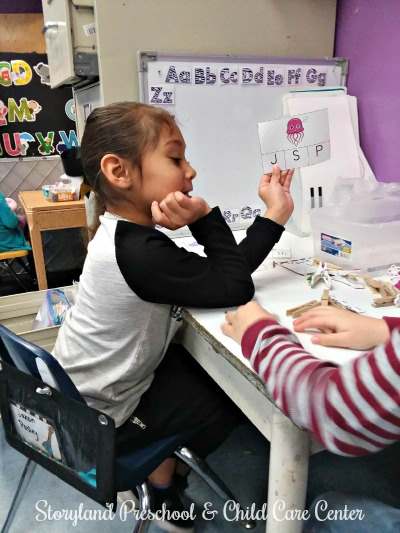 Children are learning to recognize letters and beginning letter sounds.
Children are learning to recognize letters and beginning letter sounds.GOAL: LEARNING AND PROBLEM SOLVING
- Observes objects and events with curiosity
- Approaches problems flexibly
- Shows persistence in approaching tasks
- Explores cause and effect
- Applies knowledge or experience to a new context
GOAL: LOGICAL THINKING
- Classifies objects
- Compares/measures
- Arranges objects in a series
- Recognizes patterns and can repeat them
- Shows awareness of time concepts and sequence
- Show awareness of position in space
- Uses one-to-one correspondence
- Uses numbers and counting
GOAL: REPRESENTATION AND SYMBOLIC THINKING
- Takes on pretend roles and situations
- Makes believe with objects
- Makes and interprets representations
Language Development
GOAL: LISTENING AND SPEAKING
- Hears and discriminates the sounds of language
- Expresses self-using words and expanded sentences
- Understands and follows oral directions
- Answers questions
- Asks questions
- Actively participates in conversations
GOAL: READING AND WRITING
- Enjoys and values reading
- Demonstrates understanding of print concepts
- Demonstrates knowledge of the alphabet
- Uses emerging reading skills to make meaning from print
- Comprehends and interprets meaning from books and other texts
- Understands the purpose of writing
- Writes letters and words
Return from Our Preschool Program to Our Programs Overview Page
Return from Our Preschool Program to Home Page